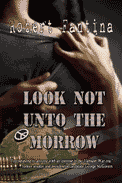"His own life was ordered. It consisted of Pam, college, his future career, his future life. He had no interest in politics, and even the draft seemed a remote possibility at best."

 |
Look Not Unto the Morrow by Robert Fantina Whiskey Creek Press
book review by Karyn Saemann
The Vietnam War upends a college student's carefully constructed life plans in this novel about love, loss, and moving on. Roger Gaines is poised to marry his high school sweetheart. Then he is drafted into military service in Vietnam. In his absence, his once-devoted girlfriend, Pam, rises to national prominence as the leader of a strident, student anti-war group. Ultimately, they take divergent paths. When he returns home from Vietnam, Roger struggles to accept his altered course, including potential new love.
The novel is generally well-written with a clear plot trajectory. Although their characters are archetypal, an unwilling Vietnam draftee and an impassioned activist, Roger and Pam's initial commitment to each other and their anguish upon separation are palpable and memorable. Palpable, too, are the fervor of Pam and other activists, whose demonstrations soon become violent; 1960's free love sexual attitudes; generational conflict between Pam and her well-off parents, whom she argues are profiting from the war; and Roger's post-war psychological hurdles. In Vietnam, Roger, also archetypically, dispenses Agent Orange, consorts with prostitutes, and kills civilians in violent scenes that linger. Roger and Pam's fictional "Madison University" is based on the University of Wisconsin, an anti-Vietnam hotbed in the 1960s. However, details about the campus and anti-war protests there are generically fictionalized in the novel so that, beyond the name, the place and events are not historically specific to the University of Wisconsin. It could have been any major U.S. college campus. A sweeping, realistic exploration of the forces and views that drove the 1960s anti-war movement.